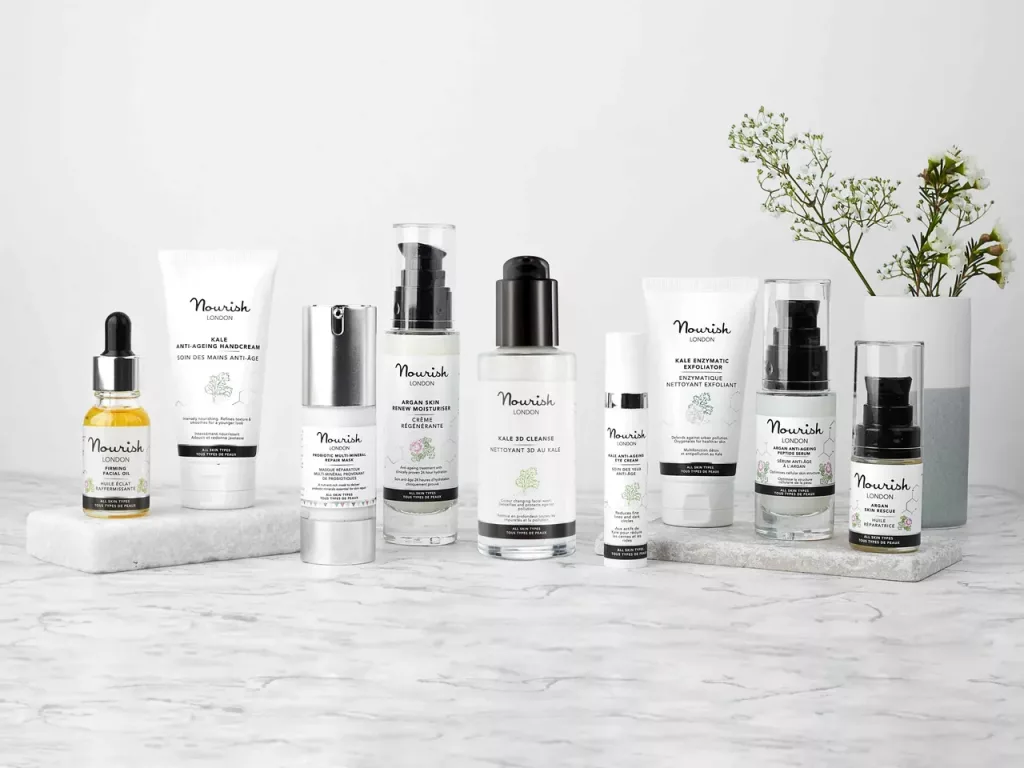3 March 2021|Business Growth, Latest Posts, Launching a business

Dr Pauline Hili, a renowned Organic Skincare Expert, Fellow of the Royal Society of Chemistry and Founder of Nourish London skincare provides a unique insight on how to build an organic and vegan skincare brand.
Tell us about your business, what do you do?
Our business is all about wellbeing and creating great formulas to make the skin healthier and happier. Fundamentally, we believe that everyone deserves to feel good about their skin and we are on a mission to provide great skincare at an affordable price. Our Natural Products Factory was incorporated in 2011 and is a vertically integrated developer, manufacturer, distributor and marketer of skin care products. Our speciality is the development of natural and organic certified products within the beauty and personal care market – both for our own brands and through white label and brand partnerships. Natural Products Factory Ltd is based in Battersea, London. Through our first brand, Nourish London, we are at the forefront of the development of clean and green products to cater for the increasing demand for high quality personal care that is also sustainable. The achievement of clinical results forms a key part of our product development plan. Our customer feedback is very clear on this point: Nourish London products improve tone, improve texture and provide long-term skin health.
What did you do before you launched your own brand?
Before starting Nourish London, I was the Research & Development Director for Neal’s Yard Remedies for many years. Neal’s Yard Remedies was the first Soil Association approved cosmetic brand, so in my role I was really helping them pioneer the development of organic skincare as a whole. Before that, I was a brewing chemist and worked for Guinness.
I have a deep-seated passion for working with consumer goods and being able to create products from scratch – something tangible, something other people get pleasure from using every day is a real gift.
What inspired you to create your own skincare brand? What was your lightbulb moment?
I don’t think I had a lightbulb moment. It was more like the dimmer switch being slowly turned up as my confidence grew. As a scientist, you want to solve problems, make things better. I wanted to create a brand to share my knowledge as a scientist and help make people’s skin healthier.
Why did you choose to launch an organic and vegan skincare brand?
I was part of the committee who set up the first Soil Association organic standards for cosmetics in the UK and, as part of my work at Neal’s Yard Remedies, organic was in my DNA. The Vegan Certification came from a desire to give the consumer a wider choice and omit any animal-based ingredients from our range. I am proud that we pioneered this at Nourish London long before it became a mass market trend.

What are the main considerations when creating and building a successful organic and vegan skincare brand?
When we set out to create Nourish London, we had a number of clear objectives that have helped build our success. Firstly, we wanted to be independent. We also wanted to give exceptional customer service and help people find the right solution for their skin no matter where they were on their skincare journey. Quality-wise, we wanted to make small fresh batches in our own factory to have full control over the quality of our own formulas. Lastly, we wanted to be in London – life in this city informs all our new product development and our own team is a celebration of its diversity.
There are a number of things to consider when building a successful organic and vegan skincare brand. Firstly, whether to certify or not to certify. This can be time-consuming and costly, but it provides a great basis to understand your raw materials and your supply chain. We certified our products from the get-go and it has proven to be a really positive step for us. Secondly, whether to manufacture or outsource. Setting up a factory and successfully manufacturing is no easy task. I am happy to say – surprise and delight – are the prevalent reactions when we tell customers their product was entirely made and formulated right here in London.
What has been your biggest challenge?
As a small business owner, we have new and creative ideas every day on where we could take the brand next. So, my biggest challenge is trying to focus on the many ideas I have, down to the most relevant and best to follow through with. I am fortunate to be surrounded with a highly creative team to assist and guide me with the choice and follow-through.
What has been your greatest achievement?
Contributing to the scientific knowledge of a large number of ingredients through the research programs I have been involved with. Another achievement I am really proud of is the development of a number of skincare products that ended up gaining ‘cult’ status. It’s a formulator’s dream come true.
What is your main source of inspiration to create new products?
Our customers, nature and plants are my source of inspiration to create new products. So many plants have very clever mechanisms for solving problems. Rose of Jericho that we use in our products is one of my favourites.
Creating products to help people improve their skin and support healthy self-esteem is the driving purpose of what we do. It’s great to be using plants and science and solving skin care issues. It’s a pretty cool job.
In regards to the aesthetics of the brand and company – what are your top three priorities when coming up with new lines and packaging?
We have some guiding principles when it comes to new lines and packaging
a. Be a test bed for pioneering sustainable ideas – we are currently working on really revolutionary sampling idea which uses paper.
b. Be nimble and prepared to change tack in the product development process. Funnelling and narrowing ideas too soon can mean you miss real opportunities.
c. If people tell you it cannot be done – do it anyway.
How important is it for your business to be part of a community and what would you say is your social purpose?
Being part of a community is really vital for our business and our social purpose is to work within our community to provide high quality effective products, an inspiring work environment for scientists and creatives to collaborate and a social principled voice in the wider beauty community.
Where do you see Natural Products Factory in five years?
We have started a fantastic research project with Swansea University looking at the Algae as a potential source of sunscreens. It’s a big milestone for the company. I would like us in five years’ time to have several research projects on the go, looking at various aspects of skin health and improved ingredients to solve skin care problems.
To have a heathy pipeline of research and new product development and be working with our current team of really creative and innovative people would be where I would like to see Natural Products Factory in five year’s time. And with Nourish London having global reach of course!
What advice would you give to aspiring entrepreneurs looking to create their own beauty brand?
Be passionate and patient in equal measure. And plan, plan plan!
About the Author

Dr Pauline Hili is the Founder of Nourish London organic and vegan skincare www.nourishskinrange.com – Nourish London is an award-winning, clinically tested certified organic, vegan and cruelty-free skincare range that is powered by plant-based ingredients, designed to enhance skin health, made in Battersea, London.






